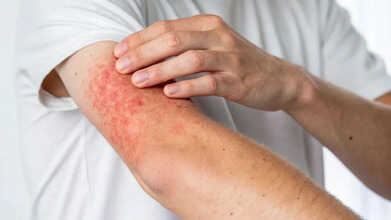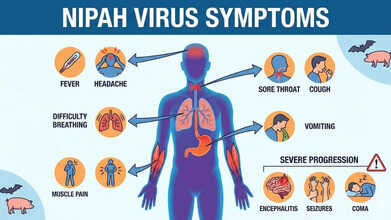- Health Conditions A-Z
- Health & Wellness
- Nutrition
- Fitness
- Health News
- Ayurveda
- Videos
- Medicine A-Z
- Parenting
How Can You Tell If Your Metabolism Is Slowing Down?

Metabolism plays a big role in our health, it’s not just about helping your digestive system work smoothly, but the way your body breaks down the food and helps nutrients get absorbed into the body that matters. But often due to one reason or the other, your metabolism can slow down, which then causes issues with people. Many people think that the reason they may be gaining weight could be because of their poor metabolism, so how does one go about fixing this issue and how do you even know that the fault lies with your metabolism.
To understand why your metabolism may be slowing down, we must understand what role it exactly plays. Metabolism is the process your body uses to turn food into energy. It's essential for everything from breathing and digestion to keeping you warm. Several things affect how fast your metabolism works, including your genes, health, and lifestyle. A slow metabolism means your body burns fewer calories, which can lead to tiredness, dry skin, weight gain, and cravings.
Why Does Your Metabolism Slow Down?
There can be many reasons why your metabolism may be slowing down. You inherit some of it, and it tends to slow down as you age, often due to changes in your body and less muscle. Men and women have different metabolisms because of body size, makeup, and hormones. What you eat matters too – not enough healthy food or a very low-calorie or high-fat diet can slow it down. A lazy lifestyle, lack of sleep, and stress can also make your metabolism sluggish. Certain health problems like diabetes or an underactive thyroid, and even environmental factors, may also play a role.
Signs You Need To Improve Your Metabolism
While these are some common signs, it is best to visit a healthcare professional and ask for their opinions before you try a solution. There are many underlying reasons as to why you are experiencing slow metabolism, it can also be a side-effect of some medicine. A healthy lifestyle goes a long way, especially for people who already have digestive issues, kidney or even mental health issues like stress and anxiety.
Constant Fatigue
Feeling tired all the time, even without a good reason, could mean your metabolism is slow. A slow metabolism means your body breaks down food into energy slowly, leaving you with low energy levels. You might feel sluggish or get tired easily throughout the day. Changes in what you eat or your body composition (how much fat and muscle you have) can also make you feel more tired.
Dry Skin
Dry skin is common in winter, but if you have it all the time, it could be a sign of a slow metabolism. Thyroid hormones help control your metabolism and also keep your skin hydrated. If your thyroid isn't working right and your metabolism is slow, your skin might get very dry.
Weight Gain
If you're eating healthy and exercising but still gaining weight, a slow metabolism could be the problem. A slow metabolism doesn't turn food into energy quickly, so you burn fewer calories. Extra calories are stored as fat, making it hard to lose weight.
Feeling Cold
Feeling cold even when it's not cold outside can be a sign of a slow metabolism. Your body generates heat through metabolism. If your metabolism is slow, your body temperature might be lower. Some studies show that people with an underactive thyroid or obesity may have lower body temperatures because of a slow metabolism. This can be because of problems with thyroid hormones, which help your body make heat.
Food Cravings
Craving sugary or fatty foods can be a sign of a slow metabolism. Studies show that cravings are related to metabolic health. This is especially true for people who don't eat enough healthy foods, have bad eating habits, or have low muscle mass and high fat mass. Cravings might also mean your body isn't getting enough energy from the food you eat, so it wants more energy.
Mood Swings
Everyone has mood swings sometimes. But if you have them often, it could be from a slow metabolism. Low energy and hormone problems that come with a slow metabolism can make you irritable and frustrated. Some older research also suggests a link between mental health issues and a slow metabolism.
Digestive Problems
Digestion and metabolism are connected. Digestion breaks down food, and metabolism turns it into energy. If your metabolism changes, like slowing down, it can affect your digestion. A slow metabolism can cause constipation, bloating, or diarrhea.
The 4 Parkinson's Signs That Appear Years Before Diagnosis

Credit: Canva
Parkinson's disease is a progressive, neurodegenerative movement disorder caused by the loss of dopamine-producing brain cells, primarily affecting people over 60. Apart from motor loss, the disease also causes cognitive decline, depression, anxiety and swallowing problems.
The first symptom may be a barely noticeable tremor in just one hand or sometimes a foot or the jaw. Over time, swinging your arms may become difficult and your speech may become soft or slurred. The disorder also causes stiffness, slowing of movement and trouble with balance that raises the risk of falls.
However, before clear symptoms begin to appear, Neurologist Rachel Dolhun says certain signs may help identify the onset of the disease decades before it is diagnosed.
“It’s important to stress that not everyone who has these symptoms goes on to develop Parkinson’s,” said neurologist Rachel Dolhun. “But we know that in some people, these can be some of the earliest signs," she told The Washington Post.
Here is what you should look out for:
1. Loss Of Smell
Loss of smell, or hyposmia, is a common and early non-motor symptom of Parkinson's disease, affecting up to 90 percent of patients. This symptom can significantly impact quality of life by reducing the enjoyment of food and diminishing appetite.
While strongly linked to Parkinson's, smell loss can also stem from other causes, including sinus problems, COVID-19, or aging.
2. Acting Out Dreams
Acting out dreams, known as REM Sleep Behavior Disorder (RBD), involves physically enacting vivid, often unpleasant dreams through shouting, punching, or kicking during sleep.
This typically happens because the brainstem fails to temporarily paralyze muscles during REM sleep. It is a strong early warning sign of Parkinson's disease, often appearing years or decades before motor symptoms. About 50 percent of people with Parkinson's experience RBD.
READ MORE: Parkinson’s Patients May Soon Walk Better With This New Personalized Brain Therapy
3. Constipation
Constipation is a very common and significant non-motor symptom of Parkinson's disease that is caused by nerve changes slowing gut muscles and potentially exacerbated by low activity and dehydration.
Constipation can also be caused by Parkinson's medications such as anticholinergics, amantadine and other common drugs such as opioids, iron/calcium antacids.
4. Dizziness As You Stand
The autonomic nervous system fails to properly constrict blood vessels or increase heart rate upon standing, often due to a lack of norepinephrine. This causes the autonomic nervous system to fail in regulating blood pressure. Over time, this leads to Neurogenic Orthostatic Hypotension.
Beyond dizziness, symptoms include blurred vision, weakness, fatigue, cognitive "fog," and "coat hanger pain" (pain in the neck/shoulders). Often times, patients experience dizziness in the morning or immediately after meals.
Diagnosing Parkinson’s disease is mostly a clinical process, meaning it relies heavily on a healthcare provider examining your symptoms, asking questions and reviewing your medical history. Various imaging and diagnostic tests used to detect disease includes CT scan, PET scan, MRI scan and genetic testing.
What Is Cold Urticaria? Doctors Warn Of Painful Allergy Caused By Cold Exposure

Credits: Canva
Beyond icy roads and fogged-up car windscreens, the coldest season can also bring on a painful condition that leaves the skin covered in red, itchy patches. Doctors have issued a warning about this lesser-known illness, which tends to worsen in low temperatures.
The condition, known as cold urticaria, affects around one in 2,000 people. It causes swelling and itching of the skin when it comes into contact with cold air, cold water, or even air conditioning. Red welts or hives can appear within minutes, and the discomfort may last for as long as two hours.
What Is Cold Urticaria?
Cold urticaria is an uncommon condition in which the body reacts abnormally to cold temperatures. It typically causes rashes or hives after exposure to cold air, water, food, or drinks. In some cases, symptoms can be more serious. According to the Cleveland Clinic, the condition may sometimes be linked to an underlying blood cancer or an infectious illness.
Griet Voet, head of a dermatology clinic in Ghent, Belgium, as per Express UK, said the condition is often confused with common winter skin problems such as eczema. “This is not just dry skin caused by cold weather, it is a genuine allergic reaction to cold,” she explained. In more severe cases, large areas of the body may be affected, particularly after swimming in cold water or spending extended periods outdoors. This can lead to intense itching, facial flushing, and even headaches, stomach pain, or fainting. Sudden temperature shifts, such as moving from a warm indoor space into cold outdoor air, can also trigger symptoms. Drinking ice-cold beverages may cause swelling of the lips, mouth, or throat.
Cold Urticaria: What Are The Symptoms Of This Disease?
Symptoms of cold urticaria differ from person to person and can range from mild to severe. They may be limited to a small patch of skin or spread across the entire body.
The most common sign is a skin rash that appears after contact with something cold. The rash usually develops once the exposure ends, as the skin begins to warm up.
The rash may include:
- Hives, bumps, or raised welts
- Itching
- Redness
- Swelling
- Fatigue
- Fever
- Headache
- Joint pain
- Fainting
- Heart palpitations
- A severe allergic reaction known as anaphylaxis
- Shortness of breath or wheezing
How Is Cold Urticaria Diagnosed?
A medical professional can often diagnose cold urticaria using a simple test. An ice cube is placed on the skin, usually on the arm, for a few minutes and then removed. If a hive or rash appears several minutes later, the result is considered positive.
In cases of familial cold urticaria, diagnosis may involve exposure to cold air for a longer duration.
Doctors may also suggest blood tests to check for any underlying illness or infection that could be contributing to the condition.
Nipah Virus Symptoms Explained As Doctors Warn Up To 75% Fatality Risk

Credits: AI Generated
Health authorities have urged the public to stay alert to Nipah virus symptoms after doctors warned that up to 75 per cent of infected patients may not survive. The UK Health Security Agency (UKHSA) has classified Nipah as a “high priority pathogen” because of its severe fatality rate and the absence of any proven treatment.
In India, the federal health ministry has confirmed two cases in the eastern state of West Bengal. This has triggered large-scale containment measures, with local officials placing nearly 200 people who had contact with the infected individuals under quarantine.
Also Read: Vitamin D Supplements Under Scrutiny As It Fails Safety Test
In response, several Asian nations have stepped up airport checks and health surveillance for travellers arriving from India. Professor Paul Hunter, an infectious disease specialist at the University of East Anglia, said identifying Nipah cases at borders is challenging, as symptoms can take a long time to appear.
What Is Nipah Virus?
According to UKHSA, Nipah virus is a zoonotic infection, meaning it can pass from animals to humans. It can also spread through contaminated food or via direct human-to-human contact. The virus was first discovered in 1999 during an outbreak affecting pig farmers in Malaysia and Singapore.
Fruit bats, especially those belonging to the Pteropus species, are the virus’s natural carriers. Research shows that Nipah can also infect other animals, such as pigs, dogs, cats, goats, horses and sheep.
Nipah Virus Symptoms
UKHSA lists the following as common symptoms of Nipah virus infection:- Sudden onset of fever or general flu-like illness
- Development of pneumonia and other breathing-related problems
- Swelling or inflammation of the brain (encephalitis) or meningitis
Symptoms usually appear between four and 21 days after exposure, although longer incubation periods have occasionally been reported. More severe complications, including encephalitis or meningitis, can develop between three and 21 days after the initial illness begins.
Also Read: Nipah Virus Outbreak In India: All That You Need To Know About This Infection
Nipah Virus Symptoms Explained As Doctors Warn 75% Fatality Rate
UKHSA has cautioned that between 40 and 75 per cent of people infected with Nipah virus may die. Those who survive can experience long-term neurological effects, such as ongoing seizures or changes in behaviour and personality. In rare instances, the virus has been known to reactivate months or even years after the first infection.
Nipah Virus: Can You Prevent It From Spreading?
For people travelling to regions where Nipah is known to occur, prevention largely involves reducing exposure risks:
- avoid contact with bats, their habitats, and sick animals
- do not drink raw or partially fermented date palm sap; if consuming date palm juice, make sure it has been boiled
- wash all fruits well with clean water and peel them before eating; avoid fruits found on the ground or those that appear partly eaten by animals
- use protective clothing and gloves when handling sick animals or during slaughter and culling
- maintain good hand hygiene, especially after caring for or visiting ill individuals
- avoid close, unprotected contact with anyone infected with Nipah virus, including exposure to their blood or bodily fluids
Nipah Virus Symptoms Can Be Transmitted Easily?
Many Nipah infections have been linked to eating fruit or fruit-based products contaminated by the saliva, urine or droppings of infected fruit bats. Human-to-human transmission can also occur through close contact with an infected person or their bodily fluids, according to Mirror.
Such transmission has been documented in India and Bangladesh, with cases often involving family members or caregivers tending to infected patients. At present, there is no specific, proven treatment for Nipah virus infection, and no licensed vaccine is available to prevent it.
So far, no Nipah virus cases have been reported in the United States or the United Kingdom.
© 2024 Bennett, Coleman & Company Limited

